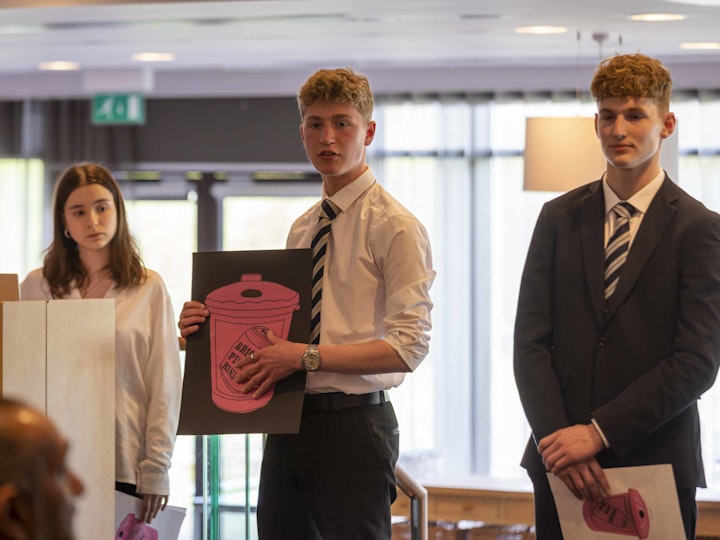Sixth form students develop entrepreneurial skills through Henley Social Enterprise Programme
Students from the Abbey School and Reading School were invited to share their business ideas with a panel of experts at the University of Reading's Whiteknights Campus.

Sixth form students from two secondary schools in Reading were given the chance to develop their entrepreneurial skills as part of the Social Enterprise Programme run by Henley Centre for Entrepreneurship, one of Henley Business School's research centres.
Students from the Abbey School and Reading School were invited to the University of Reading's Whiteknights campus to present their ideas for new and innovative social enterprises.
Tasked with developing an idea that addresses a social and/or environmental problem in the local community, the students previously attended a series of workshops to develop their ideas, led by Dr Amal Ahmadi, Lecturer in Organisational Behaviour at Henley Business School, and Charles Lovibond, Head of Business Management at the Abbey School.
Aided by a team of undergraduate and graduate mentors from Henley, the sixth form students were inspired to think about issues and challenges that they care about, working in teams to apply their learning and come up with solutions that could address the issues.
Seven teams presented their ideas to a panel of judges at the event on 17 May, with social issues ranging from an upcycling venture for care leavers, to a language translation app.
Sandwich Samaritans, an eco-friendly food delivery service providing food from locally-sourced producers, and That Time of the Month, a period poverty scheme proposing the sale of low-cost sanitary hampers to those fleeing domestic abuse, were both teams awarded £1,500. Bright Pink Bins, a recycling scheme aimed at providing work for homeless people, received a £1,000 award and SustainaBALL, which aims to refurbish and redistribute old sports kits from professional teams to grassroots organisations, received £500.
The other presenting teams were It Takes a Village, which gathered social service leavers to create and sell eco-friendly tote bags, Rise Up, which proposed teaching social care leavers how to repair and restore old furniture to upcycle it for sale, and 2 Talk, an idea for an app to instantly connect a person in need of translation services to a bilingual translator.
Jurek Sikorski, Executive Director of the Henley Centre for Entrepreneurship and chair of the judging panel, said: "Being an entrepreneur is not genetically determined; everyone has the potential to become an entrepreneur. Whether someone does or doesn’t become an entrepreneur is a function of three things: environment, personal choice and experience. With this experience behind you, your entrepreneurial journey has only just started. I wish you all great success."

Special thanks to the Henley Business School students that supported the sixth formers in developing their social enterprises:
- Ellen Whysall, BA Accounting and Management student
- Aayam Tamang, BA Accounting and Management student
- Giles McLoughlin, BA Accounting and Management student
- Yash Kothari, MSc Entrepreneurship and Innovation student
- Zenab Akbar Ali, MSc Management student
- Kajal Mathur, MSc Information Management and Digital Business student
- Afrah Anam, MSc Finance and Financial Technology student
All who attended the Social Enterprise Programme finale felt that it was a great success. The collective view is to make the Social Enterprise Programme an annual event with more local schools participating.
You might also like
Henley academics present at the Conference on Creative Economy 2030
Professor Yelena Kalyuzhnova delivers United Nations Economic Commission for Europe presentation
New Financial Year Resolutions for SMEs – top tips for 2023/24
This site uses cookies to improve your user experience. By using this site you agree to these cookies being set. You can read more about what cookies we use here. If you do not wish to accept cookies from this site please either disable cookies or refrain from using the site.